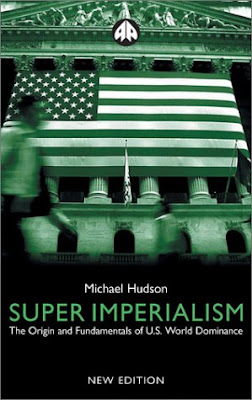 CounterPunch | Here’s the problem that faced global finance ministers this weekend: The U.S. payments deficit has been pumping excess dollars into foreign economies, whose recipients have turned them over to their central banks. These central banks have saved their currencies from rising (and thus losing foreign markets by making their exports more expensive) by buying Treasury bonds so as to support the dollar’s exchange rate by recycling their dollar inflows back to the United States – enough to finance most of our federal budget deficit, and indeed much of Fannie Mae’s mortgage lending as well.
CounterPunch | Here’s the problem that faced global finance ministers this weekend: The U.S. payments deficit has been pumping excess dollars into foreign economies, whose recipients have turned them over to their central banks. These central banks have saved their currencies from rising (and thus losing foreign markets by making their exports more expensive) by buying Treasury bonds so as to support the dollar’s exchange rate by recycling their dollar inflows back to the United States – enough to finance most of our federal budget deficit, and indeed much of Fannie Mae’s mortgage lending as well.Mr. Bush for his part would like to shape the global financial system so that foreign economies continue giving the United States a free lunch. U.S. officials control the International Monetary Fund and World Bank and use these institutions to impose neoliberal privatization policies on foreign countries, thereby destroying the post-Soviet economies, Australia and New Zealand since the 1990s, just as they destroyed Third World economies from the 1960s through the ’80s. That’s why, until last month, the IMF had lost its clients and was almost universally shunned. French President Nicolas Sarkozy led foreign calls for a “new Bretton Woods,” by which he meant not just an upgrading of U.S. dollar hegemony but a different world order – more regulated with a fairer quid pro quo. And as the Financial Times reported: “Spain’s governing Socialist party summed up the heady mood in some parts of Europe in an internal document, seen by El Mundo, that identified the summit as a moment of historic change. ‘The origins of this crisis lie in neoliberal and neoconservative ideology,’ it said.”
Mr. Paulson and other U.S. officials have long been promising foreign finance ministers that Fannie Mae and Freddie Mac securities are as good as U.S. Treasury bonds while yielding higher interest. The resulting investment in these two mortgage-packaging agencies was a major factor in their $200 billion bailout. Letting their securities go under would have ended Dollar Hegemony for good. So getting foreign acquiescence in financing future U.S. balance-of-payments deficit is inextricably bound up with how to resolve the U.S. financial and real estate bubble.


0 comments:
Post a Comment